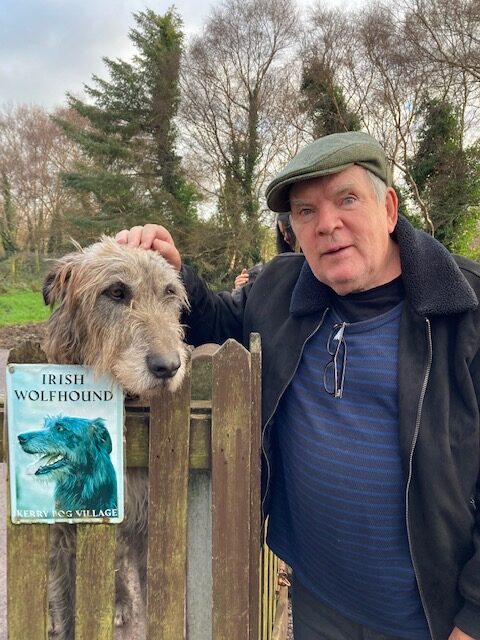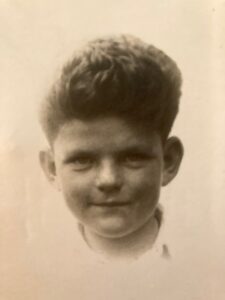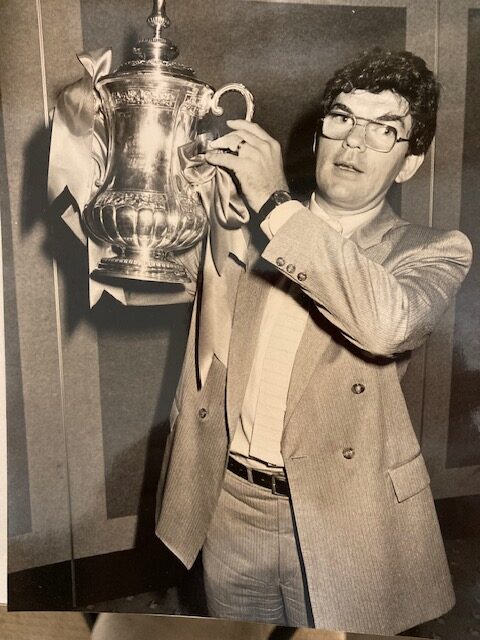22nd May 2025
Matt Eastley
Brian Twomey Confessional

Brian’s Childhood
Brian was born in the Irish southern coastal town of Cobh, situated in Cork harbour, with its strong maritime history,
where he had a happy upbringing surrounded by a large family. He has fond memories of the positive influence of his aunt,
who told him: “You are a storyteller, but unless you read you will never be able to write”. By the age of five she had him
reading the newspaper to his uncle each week. His family moved to England at the age of six and Brian expanded his love
for reading and writing. His early life was marked by that strong Irish influence, which he maintained throughout his life.

Brian’s Childhood
Brian was born in the Irish southern coastal town of Cobh, situated in Cork harbour, with its strong maritime history,
where he had a happy upbringing surrounded by a large family. He has fond memories of the positive influence of his aunt,
who told him: “You are a storyteller, but unless you read you will never be able to write”. By the age of five she had him
reading the newspaper to his uncle each week. His family moved to England at the age of six and Brian expanded his love
for reading and writing. His early life was marked by that strong Irish influence, which he maintained throughout his life.
St Mary’s
Brian’s experiences at St Mary’s were generally happy ones although he remains ambivalent about the quality of
some of the teachers. Even after all these years he is still disappointed at not being selected for the cricket team.
He says he had no aptitude for the sciences – but is unrepentant. By the sixth form Brian had three
career ambitions: an architect, lawyer, or journalist. He thinks the school never encouraged his goals or
offered sound advice so did not significantly shape his future. But he believes it was a very important chapter
in his life. He made some great friends and spent time with some fine fellow students. These are memories he still
cherishes.
The inky trade of journalism
Brian eventually became a journalist with the Kentish Times Newspaper Group where he met and subsequently
married fellow journalist, Lucy, in 1966. They moved to Germany and sold encyclopedias to the American forces.
Brian confesses he was a hopeless salesman but Lucy became top salesgirl in Europe.
Returning to England, Brian joined BOAC (later to become British Airways) to help set up the staff newspaper.
He moved to the press office before becoming marketing manager where his role included organising press trips to promote the
arrival of new aircraft, BA’s expansion into new routes or new holiday packages. From the outset he oversaw
the PR for British Airways’ Concorde fleet. A fabulous machine, sadly doomed due to a perfect storm of political
and economic factors.
The Siren Call of Casinos
Having had a long held intellectual interest in the allure of chance and gambling, aided by a previous stint as a
“board boy “with a bookie, Brian next joined Coral Casinos and worked in the casino industry in
London and Las Vegas during the late 1970s. He recalls the wealth and influence of casino “high rollers” who were
members of premium Coral casinos such as Crockfords and the Curzon House club. Brian was fascinated
by differences between the casino industries in London’s discreet Mayfair mansions and the brash over
the top lifestyle of Las Vegas hotels. At that time the turnover in London’s
casinos outstripped the annual turnover of Las Vegas and Monte Carlo combined. While the law forbade the
advertising of casino gambling in the UK, Brian was able to place many stories about Coral casinos, focusing
on the fine dining, wines, cigars, and exclusive ambience rather than promoting gambling. High rollers who
understood the unspoken undertone certainly noticed; those who didn’t, weren’t welcome anyway.
Moving to Sydney and the USA and back again
Five out of the six godparents of their three children (at that time aged 9, 7 and 4) encouraged Brian and Lucy
to join them in Australia in 1981. The family settled in the northern beaches area of Sydney where Brian joined
Burson-Marsteller, the world’s largest PR company. He was poached by a client, Wang Laboratories, in 1987 and,
as a result, the family spent four stimulating years in Boston. where Brian worked as the Director of Communications for
Dr. Wang and his son Fred. Dr Wang held 41 patents including his invention of core memory for computing
and word processors
Returning to Sydney he became a founding director of Chance Communications, a nod to his belief in the power of fate.
During his St Mary’s ‘confession’ Brian discussed his career in public relations and advertising, highlighting the differences
between the two disciplines. Brian also talked about his later work right up until 2020 with a UK company specialising in
customer success stories that made them the “heroes”, as a refined part of their branding. It would be conducted by telephone link ups.
As Brian explained, the clients in places like San Diego, Dusseldorf, Kowloon, Osaka or Chennai, even Adelaide,
had no idea where he was nor how old he was.

Brian, pictured with the FA Cup in 1986 after one of the few times the trophy was allowed out of England. It was brought to Sydney by the Australian Craig Johnston, a Liverpool player, for a Wang Laboratories charity sponsorship event Brian was promoting.
0 Comments